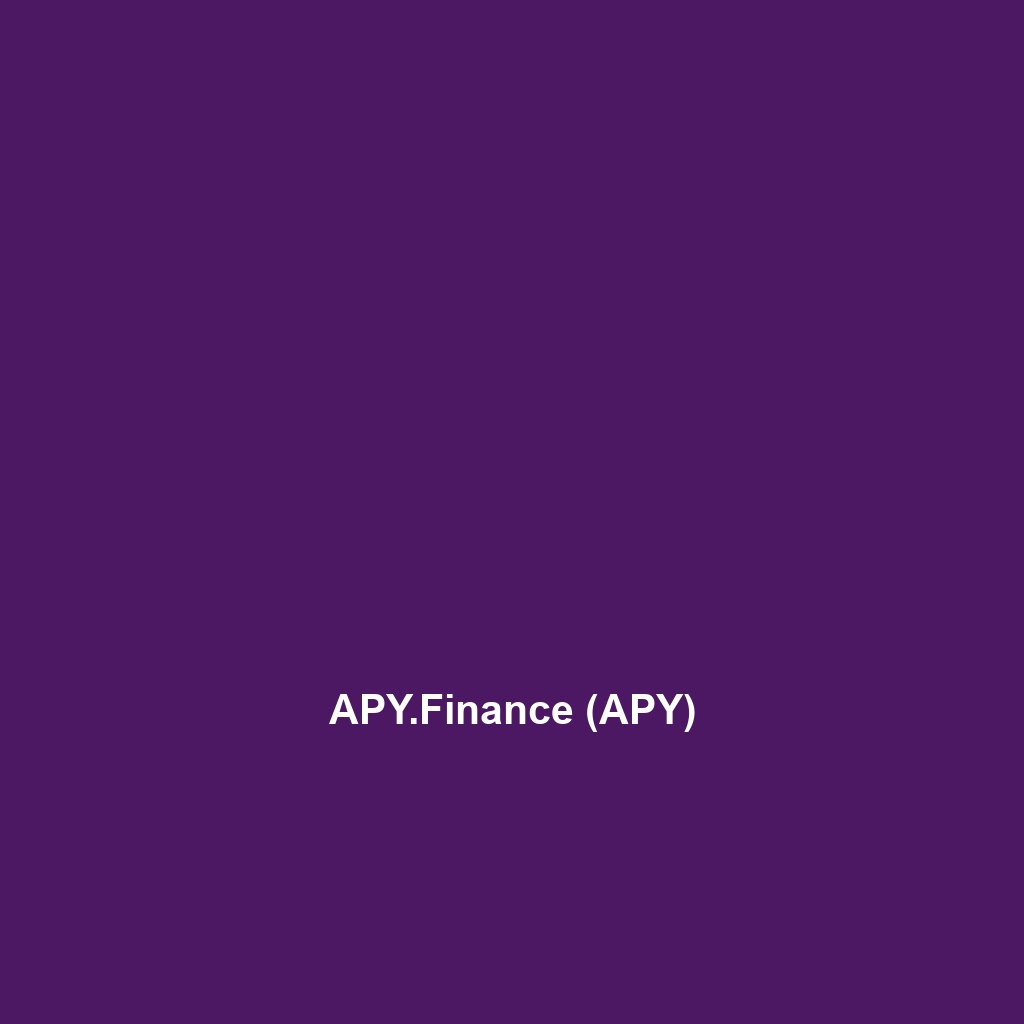Your cart is currently empty!
Tag: DeFi competitors

APY.Finance (APY)
APY.Finance (APY): A Comprehensive Overview
APY.Finance (APY) is a sophisticated cryptocurrency designed to revolutionize the decentralized finance (DeFi) landscape. In this article, we delve into the intricate details of APY, exploring its history, technology, market performance, and future prospects.
1. Name and Ticker Symbol
The cryptocurrency in focus is APY.Finance, and its ticker symbol is APY.
2. Founders, Launch Date, and History
APY.Finance was founded by a group of innovative developers and DeFi enthusiasts, notably led by financial and tech experts who sought to simplify yield farming for users. It was officially launched in 2020. Since its inception, APY.Finance has marked several key milestones, including the launch of its yield aggregator and partnerships with various DeFi protocols.
3. Blockchain Platform
APY operates on the Ethereum blockchain, utilizing its smart contract capabilities to facilitate complex financial transactions. While Ethereum is a layer 1 solution, APY.Finance leverages existing blockchain technology to enhance its services within the DeFi ecosystem.
4. Purpose and Use Case
The primary purpose of APY.Finance is to provide users with a simplified yield farming experience. By automating the process of staking assets across different protocols, it allows users to maximize their returns effortlessly. The main use cases include yield aggregation, liquidity provision, and portfolio management.
5. Technology and Consensus Mechanism
APY.Finance employs smart contracts powered by Ethereum€„¢s Proof of Work (PoW) consensus mechanism. As Ethereum transitions to Proof of Stake (PoS) with the Ethereum 2.0 upgrade, APY will adapt to the newer framework, contributing to scalability and operational efficiency while maintaining a secure transaction environment.
6. Supply and Tokenomics
The total supply of APY tokens is capped at 10 million APY, with a circulating supply that permits incentives for active participants in the ecosystem. The project also features staking rewards for token holders, as well as burn mechanisms designed to gradually reduce the total supply, enhancing the token’s value.
7. Use Cases and Adoption
APY.Finance is increasingly adopted by DeFi users for yield aggregation. Partners of the platform include prominent DeFi projects such as Yearn.Finance and Aave, showcasing its effectiveness within the broader cryptocurrency ecosystem.
8. Market Performance and Metrics
As of October 2023, APY has shown considerable market engagement with a market cap of approximately $50 million. Historical price trends indicate notable volatility, with trading volumes frequently surpassing $5 million on notable exchanges. Investors showing substantial interest in yield farming contribute to this dynamic market performance.
9. Where to Buy and Trade
APY can be traded on various centralized exchanges (CEXs) and decentralized exchanges (DEXs). Prominent platforms include Uniswap, KuCoin, and Binance. Users are advised to ensure they conduct due diligence before trading on any platform.
10. Security and Risks
Like many cryptocurrencies, APY faces inherent security risks, including vulnerabilities in smart contract code. However, the project has successfully navigated through the DeFi space without major incidents. Regulatory scrutiny of cryptocurrencies remains a concern that could impact APY€„¢s operations.
11. Community and Governance
APY.Finance employs a community-driven governance model, where APY token holders have a say in major decisions such as protocol upgrades and partnerships. Engagement within the APY community is encouraged through forums and social media channels, fostering a robust ecosystem.
12. Competitors and Differentiation
In the competitive DeFi landscape, APY.Finance distinguishes itself through its user-friendly interface and efficient yield aggregation strategies. Its main competitors include other yield aggregators like Yearn.Finance and Harvest Finance, yet APY€„¢s automated strategies provide a unique advantage.
13. Roadmap and Future Developments
The roadmap for APY.Finance includes several upcoming developments, such as integration with additional DeFi protocols, the expansion of its staking mechanisms, and enhancing its user interface for greater accessibility. The team is also exploring opportunities for cross-chain compatibility.
14. Wallet Compatibility
APY.Finance tokens are compatible with various wallets, including MetaMask, Ledger, and Trust Wallet, making it convenient for users to manage their assets securely.
15. Regulatory and Compliance Status
As of now, APY.Finance has operated within the legal frameworks set by various jurisdictions, with ongoing monitoring of evolving regulations in the cryptocurrency sector. However, the project must remain vigilant to avoid potential legal challenges in different markets.
16. Recent News and Updates
Recent developments include partnerships with key DeFi players and platform upgrades aimed at improving user experience. In addition, the APY team frequently provides community updates via social media and news outlets to keep stakeholders informed.
17. Summary and Call to Action
APY.Finance represents a significant player in the DeFi sector, offering optimized yield farming and liquidity solutions. With a robust technology foundation, dedicated community governance, and a clear roadmap for future developments, APY is well-poised for growth in the burgeoning cryptocurrency landscape. For anyone interested in maximizing their DeFi investments, APY.Finance is certainly worth following.
For additional insights, visit UpCube.net. Also, check out the cryptocurrency€„¢s UpCube.net. For more detailed information, refer to the official Aave website.